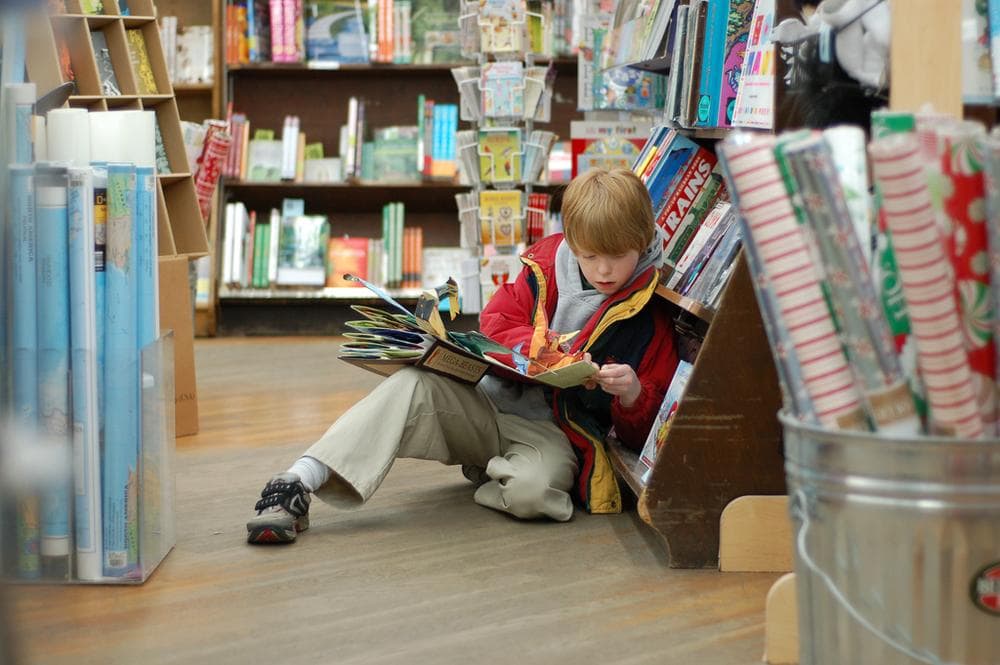Advertisement
A Local Bookstore Reinvents To Survive 50 Years

Back in the mid-1990s, it seemed the days of the local, independent bookstore were numbered as mega-stores like Borders moved into towns and cities across the country.
But Friday it is Borders closing its doors for good as it begins liquidation. The 14 Borders stores in Massachusetts will close, including the company's largest store in Downtown Crossing.
And while plenty of independent bookstores in the area were pushed out along the way, some managed to survive. We spoke to Dana Brigham, the store manager at Brookline Booksmith in Coolidge Corner, and asked her why she thinks Borders ultimately went under:
Dana Brigham: They've over-expanded and made some pretty big mistakes as far as their business model and the writing has been on the wall for quite some time.
Bob Oakes: What was the biggest mistake?
I think that when they had their online business go to Amazon instead of developing their own Web presence, a la most of the indies and certainly Barnes & Noble, that was a big mistake.
And then, in my opinion, when they began filling their corporate officer spaces with people with no experience in book selling or publishing. Book selling is just not any kind of retail, so that probably didn't do them any good.
Do you find a certain irony in this? Ten or 15 years ago, the conversation was all about how the mega-stores like Borders would put all the local, independent bookstores out of business and now here you are, still standing, while Borders closes.
It is ironic although there, too, I am not surprised, because the love affair with "bigger is better" and "everything you ever buy at a big store is cheaper" was bound to fail.
And eventually people came to understand again, I think, that less is more and a curated, distilled selection of books in a community bookstore that gives back to the community has a lot more mileage than a cookie-cutter type store. The perception that they have every book you'd ever want — it ain't necessarily so.
So you think you're able to survive while a big organization like Borders wasn't because you know how to cater, you know how to connect to the community?
Really, I do feel that. Our core mission has always been based in the community and in customer service. One of our mottos is, "Every customer should have a better-than-expected experience," and we'll do everything we can to make that happen.
Back in the day when we had eight superstores, super bookstores, open within a five-mile radius of us in the early-90s, we compared ourselves to a tugboat as opposed to an oceanliner — in that these mega-chains, to make a change, have to turn about quite slowly, whereas we're the little tugboat that can sort of reinvent, focus, be nimble and keep reinventing ourselves as needed to serve our customers and our community.
Borders is closing, but the other big mega-store, Barnes & Noble, is still in business. However, some people may remember that the Barnes & Noble across the street from you in Coolidge Corner did close. I wonder how that store, and its presence and then disappearance, affected your business?
Yes, they were there for 15 years and we went from good, healthy growth to pretty flat, almost no growth over the course of the first few years and then in '95 Amazon came on to the scene.
So it took us some years to sort of recalibrate, if you will. So when the Barnes & Noble closed, December '08, not to wish anyone ill, but we were not displeased and it has helped a great deal.
Talk about e-books. How big a threat do they pose to you now and how are you dealing with that?
Well we sell e-books, we sell Google Editions on our website. However, there is a burgeoning business in the e-book world that is happening much more quickly than anyone anticipated, I think, so it's definitely having an effect.
It is not uncommon thing for us to spend time with a customer or see them browsing one of our great "Suggested Book" tables and then have them order it on their phone. So that's pretty painful.
Will it ever get easy being a local bookstore or have you accepted that there'll always be a fight in one way or another and that it's going to be more like surviving?
Yes, there's a saying that we've used for the past some number of years, probably 15 at least, "surviving is the new thriving." And it's never been easy, it's not an easy business ever — it's complicated, low margins -- but I think we're used to reinventing and keeping on and keeping on and that's what we're planning to do.
The store will be 50 this October, so we're looking for another 50.
This program aired on July 22, 2011.